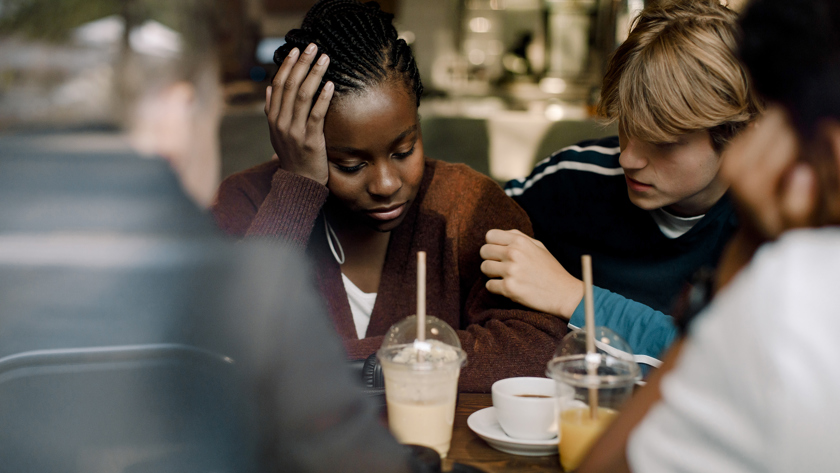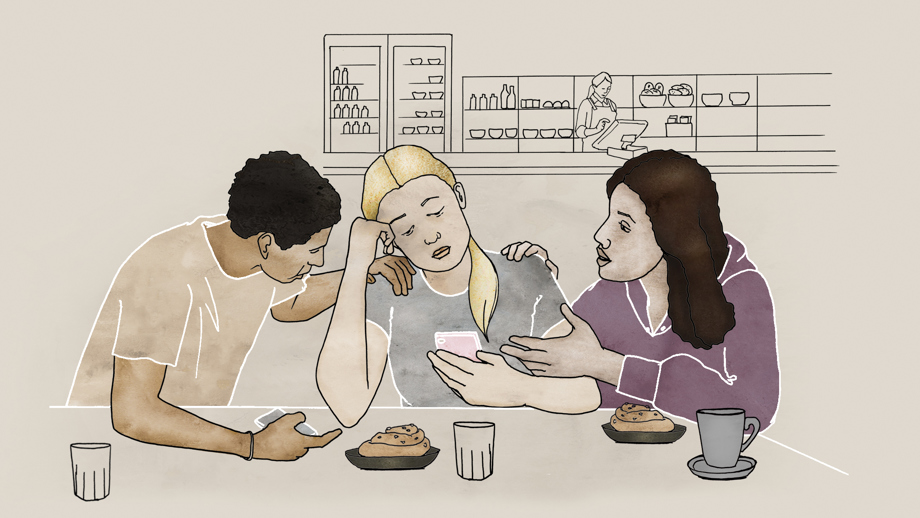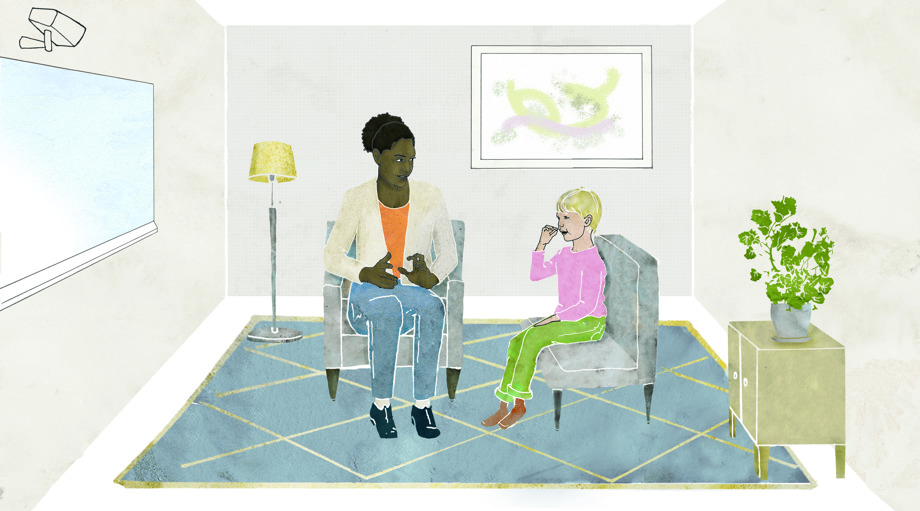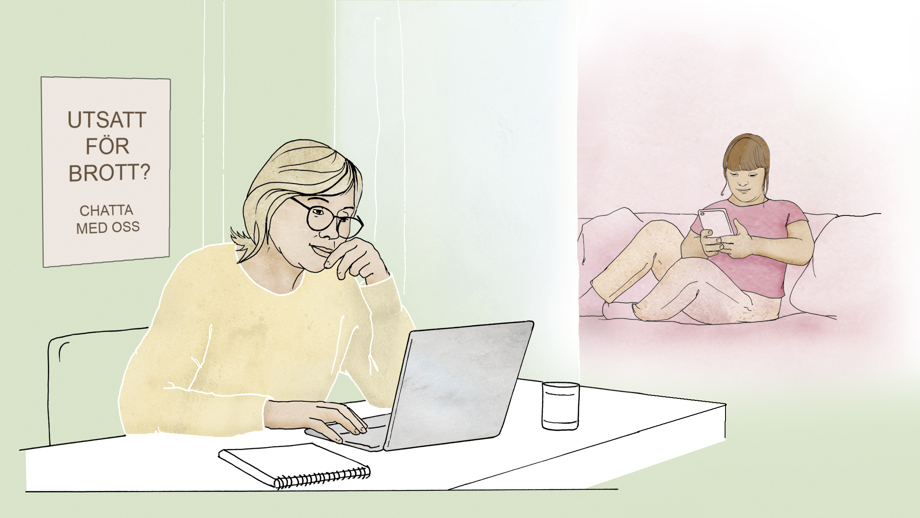
Information for those who've been exposed to crime
Everyone has the right to be who they are, and to live their lives as they wish. This is an important right for all people, both children and adults. It applies to everyone, no matter what family they belong to or where they were born and raised.
The freedom to develop into who you want to be
Parents have a responsibility to support and guide their children so that they can cope with life. Parents have the right to an opinion on the choices their children make. What parents think are good choices may differ from one family to another. This may depend on the parents’ background, such as the traditions they themselves have grown up with. It doesn’t matter what your parents’ values and traditions are, as long as you are allowed to develop into the person you want to be.
The older you become, the more freedom and scope you should have to make your own choices. The fact that young people can take more responsibility for their lives and choices than younger children is an important part of the path to adulthood.
In some families, children and young people are not given more freedom and therefore do not have the scope to become the people they want to be. Some children and young people feel that their freedom diminishes as they get older, and that their family prevents them from making their own choices. This can include parents deciding which clothes their children wear, which lessons they can attend at school, and which other children and young people they can socialise with.
Film about honour-based violence and oppression (in Swedish)
Devin Rexvid is a senior lecturer and researcher at Stockholm University. In this film, he explains what honour-based violence and oppression is, what it can consist of, and what violence and oppression can look like. He also explains what support and help is available for victims.
You have the right to go to school
Children and young people have a right to education. This means that all children should be able to go to school. It also means that all children should be able to attend all lessons, even if their parents do not want them to. Sweden has a concept called ‘compulsory schooling’. Compulsory schooling means that children should attend all teaching at compulsory school level, in other words up to and including year nine. Both schools and parents have a responsibility to ensure that children attend all teaching at compulsory school level.
Some children and young people have parents who do not want to allow them to attend certain lessons. This could involve physical education lessons or sex education teaching at school, for example. However, parents must not prevent their children from attending lessons.
The freedom to love who you want
Everyone has the right to love whoever they want. This also means that you have the right to choose how you want to live you life, and with whom. Your family should not be able to decide who you will marry or live with. Your family must not control who you are together with. Nor may your family tell you who to marry or force you to get married if you do not want to. You have the right to decide for yourself if you want to get married in the future, and – if so – with whom.

Child marriage crimes and forced marriage
If you don’t want to get married but you do so because your parents or someone else wants you to, it is not voluntary. It is not acceptable for someone to pressure or coerce you, whether through threats or violence or by trying to make you feel guilty if you don’t do what they want you to do.
Nor are your parents or other people allowed to take you to another country to marry you off. It doesn’t matter if this is allowed in that country. In Sweden, both child marriage and forced marriage are crimes. It is also a crime to plan and prepare to marry off a child, or to marry someone off against their will.
If you are worried that you or a sibling, a cousin or a friend will be married off, it is good to speak about your worries with someone you trust. Anyone who risks being married off has a right to protection and support from society. Social services and the police can help with protection and support.
If you don’t know who to talk to, you can contact organisations such as Linnamottagningen, Somaya women’s shelter and young women’s shelter, or Terrafem, which work to provide support for people who risk being married off or who live with honour-based oppression. Terrafem can provide support in many different languages.
If the police suspect that a family is planning and preparing to commit forced marriage or child marriage crimes, they must begin an investigation. This applies regardless of who has reported the crime to the police, and even if the victim does not want to report it. The investigation also includes an assessment of what protection the victim may need.
The right to your own sexuality
In families where there is control due to honour norms, it is common for children and young people’s sexuality to be controlled. The family approves who the children and young people in the family can spend time with. This control often means that any sexual orientation other than heterosexual is not accepted by the family. As a result, many people who identify as gay, bisexual, transgender or queer, for example, are forced to hide their sexuality from their family or risk oppression, intimidation and violence.
The family may punish children and young people who act out their sexuality, for example, by threatening to ostracise them from the family, or by planning forced marriage or conversion attempts that may involve sexual abuse. A conversion attempt is when someone forces or influences a person to change their sexual orientation, gender identity or gender expression. This is done through so-called ‘treatment’, such as therapy or medication.
People who are not allowed to live out their identity or sexuality because of control from family or relatives may need protection from the police and social services. If you feel threatened, or if you are worried about someone else, you can contact the police. In emergencies, you should call the emergency number 112. If it is not an emergency, you can visit a police station or call the police on 114 14.
If you need support or advice, you can contact the Support Service operated by the Swedish Federation for Lesbian, Gay, Bisexual, Transgender, Queer and Intersex Rights (RFSL). You can also contact Save the Children Sweden’s Love is Free support chat service.
Protection against genital mutilation
In some families that live in an honour context, female genital mutilation is used as a means of controlling girls’ and women’s sexuality. In Sweden, planning and performing genital mutilation is forbidden, and anyone who does so can be punished. Not only is it forbidden to do so in Sweden, it is also forbidden to take a child to another country to perform genital mutilation there. It doesn’t matter if genital mutilation is allowed in the country where the family is going.
Female genital mutilation (FGM) involves cutting off all or part of the outer labia, the inner labia or the clitoris from a girl’s genitals. FGM is harmful, and can be dangerous for the person who undergoes it. Those who have undergone FGM can suffer from a wide range of physical problems afterwards, which can last a lifetime.
Children have a right not to be subjected to any form of violence. This is a human right. Genital mutilation is an expression of violence. It is both physical violence, through the procedure itself, and psychological violence, through the trauma that the victim undergoes as a result of the abuse. Genital mutilation can also be an expression of sexual violence when it is carried out with the aim of controlling sexuality.
Examples of problems include:
- difficulties and pain when having sex,
- problems with pain and unpleasant smells during menstruation,
- scars after circumcision chafing and make it difficult to sit, and
- difficulties urinating.
Genital mutilation can also lead to psychological distress for the victim, due to fear and unpleasant memories of the procedure.

The UN Convention on the Rights of the Child
The Convention on the Rights of the Child is an international law that has also been adopted as Swedish law. The Convention applies to all children, regardless of their age, their origin or where they live. Children are all people under the age of 18.
In all actions concerning children, the best interests of the child shall be a primary consideration. This is stated in Article 3 of the Convention on the Rights of the Child, and is one of the fundamental principles of the Convention.
Children who are mature enough to form their own views shall, in accordance with Article 12, have the right to express their views freely in matters that affect them. The child’s views shall have a greater impact on their own life as they grow older and more mature.
Article 19 of the Convention requires State Parties to take all appropriate measures to protect children from all forms of physical or mental violence, injury, abuse, neglect, maltreatment or exploitation, including sexual abuse.
The Convention also prohibits exposing children to harmful practices.
A child who has been forced to leave their home environment for any reason shall have the right to special protection and assistance from the state, and State Parties shall ensure that such alternative care is available. This is detailed in Article 20.
Help is available
Children and young people have the right not to be punished for being who they are. Being punished because their sexuality, the way they dress or their choice of friends, for example, is not accepted by the family’s rules is not acceptable, and can be illegal. If you feel controlled or threatened by someone in your family or by relatives, or if you are worried about someone else, it’s a good idea to share your concerns with someone you trust.
If you can’t or don’t want to talk to someone close to you, you can contact an organisation that works to help people who are controlled or threatened by their families. You can find contact details for various organisations that can provide support and help below.
If you are the victim of something you think may be a crime, you can report it to the police, either by calling 114 14 or by visiting a police station. If you are in urgent danger, you should call the emergency number 112. You do not need to know that what has happened is a crime – it is up to the police to investigate what you report.
You can always contact the police or social services in your municipality for help and protection.
Anyone who has been the victim of a crime has the right to compensation, and this also applies to victims of honour-based crimes. With the tightening of the law in recent years, it is possible to obtain more compensation for crimes committed with an honour motive than if the crime is not found to have been committed in an honour context.

Getting help and support
The Swedish Police Authority
The police receive reports of crimes and then investigate the reported crimes. They can also refer you to other services if you need someone to talk to about what you have experienced. If you are threatened or subjected to violence, the police can offer you protection.
Social services
The social services in each municipality are responsible for providing help and support to victims of crime and their families. Below is a link to the website of the Swedish Association of Local Authorities and Regions, which has contact details for your municipality.
GAPF Support Line
The national association Glöm Aldrig Pela och Fadime (‘Never Forget Pela and Fadime’, GAPF) offers support and advice via its support line. It is open 24 hours a day, every day of the week, all year round. Victims, relatives and professionals can contact the support line for help. The support line is staffed by people with experience of dealing with those who are restricted by honour norms. Calls are free, you can remain anonymous, and support staff have a duty of confidentiality.
Linnamottagningen
Linnamottagningen is a centre for young people who have been victims of honour-based violence and oppression, or who have been married off or are at risk of being married off against their will. The centre can provide both emergency and long-term help. The centre has expertise in LGBTQI and cultural issues, and can also provide advice to professionals who come into contact with victims. The centre has a national hotline.
The "Love is free" support chat service
Save the Children Sweden operates a support chat service called ‘Kärleken är fri’ (‘Love is Free’). The service is run by volunteers, for children and young people who need support and advice on a wide range of honour-based issues. Children and young people can ask questions about rights, honour-based violence and oppression, restrictions and forced marriage, among other issues.
RFSL Support Service
The Support Service operated by the Swedish Federation for Lesbian, Gay, Bisexual, Transgender, Queer and Intersex Rights (RFSL) provides support for LGBTQ people who have been subjected to harassment, threats or violence. Relatives and friends of LGBTQ people who are victims of violence and professionals who come into contact with the target group can also get in touch. Calls to the support centre are free, and can be made anonymously.
Somaya women's shelter and young women's shelter
Somaya women’s shelter and young women’s shelter is a non-profit organisation that supports girls, women and LGBTQI people with a foreign background who are victims of intimate partner violence or who live in an honour context. Somaya’s operations are multilingual and include a support line, a support chat service, sheltered accommodation and an activity centre. The staff have extensive experience of helping people who need protection or to escape from violence and oppression.
Terrafem
Terrafem is a non-profit organisation that works to ensure girls and women have the right to live their lives free from men’s violence. Terrafem operates a national hotline for girls and women of foreign origin, and has contact with victims from different countries and in different languages. Terrafem also operates a legal hotline and a women’s helpline.
Tjejers Rätt i Samhället ("Girls' Rights in Society"), TRIS
TRIS is a non-profit organisation that works to combat honour-based violence and oppression. TRIS offers help to adults, children and young people who are subjected to or at risk of being subjected to honour-based violence and oppression. TRIS has specific expertise in dealing with children and young people with intellectual disabilities. TRIS operates a support line, and can also offer temporary or sheltered accommodation for victims.
The Ministry for Foreign Affairs' support line
Information campaign and materials
A national information campaign focusing on legislation and tools to combat honour-based violence and oppression was launched in June 2022. The information material is aimed at children and young people who are at risk, their families and friends, and professionals who come into contact with children and young people. The material can be downloaded from hedersförtryck.se, and is available for various different channels and entities. The campaign has been advertised on social media, digital billboards and public transport in major cities.